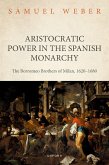In Italy, the powerful Borromeo family of Milan have long been held up as a rare example of paternalist aristocrats who withstood the temptations of self-enrichment so many of their peers succumbed to during the period of Spanish rule. Aristocratic Power in the Spanish Monarchy, the first major study of the family in the seventeenth century, challenges this myth and explains how it came about. Based on research in the previously inaccessible Borromeo private papers, the volume details the Borromeo's increasing involvement with, and dependence on, the patronage of the kings of Spain. At the center of the analysis are the ways in which one family sought to rationalize and conceal this controversial relationship in the face of popular opposition to their methods of buying their way into political power. As their self-seeking behavior came under scrutiny, the clients of successive minister-favorites reinvented themselves as paternalist courtiers committed to delivering good governance for the subject populations under their rule. In doing so, the book offers new perspectives on broader questions: through a case study of three brothers from a representative noble family, it explains a major shift in aristocratic power in the seventeenth century, uncovering how dissimulation and subterfuge became central to the preservation of social privilege in an age of unprecedented threats to established power from below. Steeped in sociological and anthropological research on elite power, this captivating story from seventeenth-century Italy tells us much about the reproduction of social inequality in our own times.
Dieser Download kann aus rechtlichen Gründen nur mit Rechnungsadresse in A, B, BG, CY, CZ, D, DK, EW, E, FIN, F, GR, HR, H, IRL, I, LT, L, LR, M, NL, PL, P, R, S, SLO, SK ausgeliefert werden.









